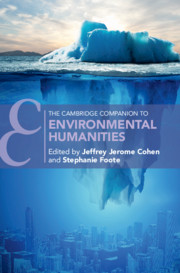Book contents
- The Cambridge Companion to Environmental Humanities
- The Cambridge Companion to Environmental Humanities
- Copyright page
- Contents
- Notes on Contributors
- Acknowledgments
- Chronology
- Chapter 1 Introduction: Climate Change/Changing Climates
- Chapter 2 The Commons
- Chapter 3 Rights
- Chapter 4 Time as Kinship
- Chapter 5 The Nature of Gender
- Chapter 6 Race, Health, and Environment
- Chapter 7 Narrative and Environmental Innovation
- Chapter 8 Climate Fictions: Future-Making Technologies
- Chapter 9 Apocalypse/Extinction
- Chapter 10 Multispecies
- Chapter 11 Food
- Chapter 12 Plants
- Chapter 13 Extraction
- Chapter 14 Ice/Water/Vapor
- Chapter 15 Rocks
- Chapter 16 Coal/Oil
- Chapter 17 Waste
- Chapter 18 Ecomedia
- Chapter 19 New Materialism and the Nonhuman Story
- Chapter 20 Risk
- Chapter 21 Coda: Virus
- Bibliography
- Index
- Cambridge Companions To Literature
- References
Chapter 21 - Coda: Virus
Published online by Cambridge University Press: 12 August 2021
- The Cambridge Companion to Environmental Humanities
- The Cambridge Companion to Environmental Humanities
- Copyright page
- Contents
- Notes on Contributors
- Acknowledgments
- Chronology
- Chapter 1 Introduction: Climate Change/Changing Climates
- Chapter 2 The Commons
- Chapter 3 Rights
- Chapter 4 Time as Kinship
- Chapter 5 The Nature of Gender
- Chapter 6 Race, Health, and Environment
- Chapter 7 Narrative and Environmental Innovation
- Chapter 8 Climate Fictions: Future-Making Technologies
- Chapter 9 Apocalypse/Extinction
- Chapter 10 Multispecies
- Chapter 11 Food
- Chapter 12 Plants
- Chapter 13 Extraction
- Chapter 14 Ice/Water/Vapor
- Chapter 15 Rocks
- Chapter 16 Coal/Oil
- Chapter 17 Waste
- Chapter 18 Ecomedia
- Chapter 19 New Materialism and the Nonhuman Story
- Chapter 20 Risk
- Chapter 21 Coda: Virus
- Bibliography
- Index
- Cambridge Companions To Literature
- References
Summary
Risk in the global economy is often borne by those with the least political agency or monetary resources, who also bear the brunt of the environmental damage inflicted by a system of unstoppered industrial development. Environmental humanities seeks greater justice and equality within human societies and in all ecological relationships; it can therefore model how risk is absorbed by those without access to economic and political advantage. We have to imagine a more equitable society before we can build it. The environmental humanities can create opportunities for creative and scholarly work to rethink its organizational and logical structure, to risk upending received rhetorical models in creative and scholarly work. Environmental humanities has a chance to reconceive how the “human” relates to the world around it, questioning the human as primary subject and imagining a way of seeing and describing the world as a horizontal shared space rather than a vertical, teleological hierarchy. It’s risky to practice new modes of expression. It’s even riskier to subordinate the human in a field where the word “human” is predominant. Environmental humanities is the place to take that risk.
Keywords
- Type
- Chapter
- Information
- The Cambridge Companion to Environmental Humanities , pp. 286 - 295Publisher: Cambridge University PressPrint publication year: 2021



